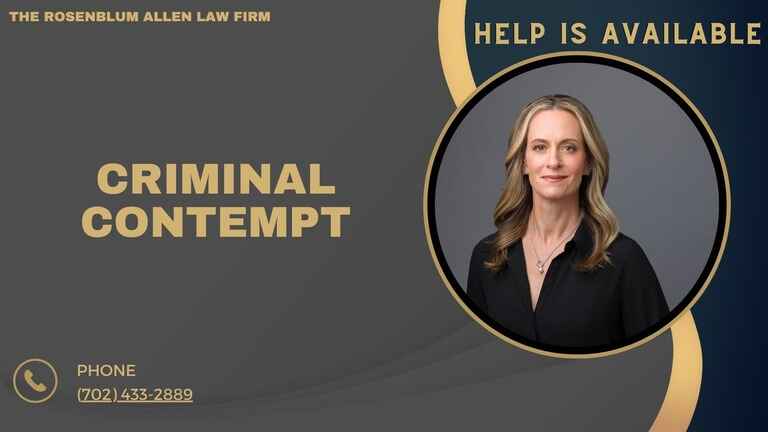Definition of Criminal Contempt
Criminal contempt is a legal term that refers to actions that disrespect or defy the authority of the court. It is a way for the judicial system to maintain order and guarantee compliance with its rulings. Understanding criminal contempt is essential, especially if you find yourself involved in legal proceedings.

Understanding What Criminal Contempt Is
At its core, criminal contempt occurs when someone intentionally disobeys or shows disrespect for a court order or the court itself. This type of contempt is treated seriously because it undermines the court’s authority and disrupts the legal process.
Distinction Between Civil and Criminal Contempt
It’s important to distinguish between civil and criminal contempt, as they serve different purposes:
- Civil Contempt: Generally aimed at compelling compliance with a court order. For example, if a party fails to pay child support, they may be held in civil contempt to force payment.
- Criminal Contempt: Focuses on punishing the offender for actions that disobey or disrespect the court. This can involve fines or jail time.
Understanding these distinctions helps clarify the legal ramifications of contempt charges.
Types of Criminal Contempt
Criminal contempt can be categorized into two main types: direct and indirect contempt. Each type has its own characteristics and implications.
Direct Contempt
Direct contempt occurs in the immediate presence of the court. Here are some examples:
- Disruptive Behavior: Loud or disruptive conduct during a court session.
- Refusal to Obey Court Orders: Ignoring a judge’s instruction while in court.
Consequences and Legal Process
When a person is found guilty of direct contempt, the court can impose immediate penalties, such as fines or even jail time. The judge has the authority to address the behavior on the spot, which can lead to swift consequences.
Indirect Contempt
Indirect contempt occurs outside the court’s presence but still violates a court order. Common examples include:
- Failure to Comply with Court Orders: Not adhering to a custody arrangement or not paying ordered child support.
- Ignoring Subpoenas: Failing to respond to a legal summons.
Consequences and Legal Process
For indirect contempt, the process usually involves the filing of a motion to hold someone in contempt. The court then schedules a hearing where the alleged contempt will be evaluated. If found guilty, penalties may include fines or jail time.

Legal Standards for Criminal Contempt
When dealing with criminal contempt cases, certain legal standards must be met.
Burden of Proof
The burden of proof in criminal contempt cases lies with the party bringing the contempt motion. This means they must provide sufficient evidence to support their claims.
Standard of Proof Required (Beyond a Reasonable Doubt)
The standard of proof in these cases is high. The prosecution must demonstrate that the contemptuous act occurred beyond a reasonable doubt. This is the same standard used in criminal trials, reflecting the serious nature of the charges.
Intent and Mens Rea in Criminal Contempt Cases
For a successful contempt charge, the court must consider the intent behind the actions. The offender must have acted willfully or with knowledge that their behavior would violate a court order. If someone did not understand the order or was unable to comply, this could affect the outcome of the case.
Common Scenarios Involving Criminal Contempt
Understanding when criminal contempt might occur can help individuals navigate legal challenges. Here are some common scenarios that lead to contempt charges.
Disobeying Court Orders
One of the most frequent reasons for criminal contempt is the failure to follow a court order. This can happen in various situations, including:
- Child Custody Arrangements: Not adhering to visitation schedules or failing to return a child as ordered.
- Support Payments: Ignoring court-ordered child support or alimony payments.
- Restraining Orders: Violating an order of protection by contacting the protected party.
Examples of Disobedience Leading to Contempt
Here are some specific behaviors that can lead to contempt charges:
| Situation | Behavior Leading to Contempt |
|---|---|
| Child Custody | Keeping the child away from the other parent contrary to the court’s ruling |
| Support Payments | Failing to pay monthly child support as ordered |
| Restraining Order | Approaching or contacting someone despite a court order not to do so |
Disrupting Court Proceedings
Disruption in the courtroom can also lead to contempt charges. Disrespectful behavior undermines the judicial process. Examples include:
- Interrupting Court Sessions: Speaking out of turn or refusing to remain silent.
- Using Inappropriate Language: Cursing or making threats while in court.
- Failing to Follow Courtroom Rules: Not adhering to the dress code or proper conduct expected in court.
Behavior That Constitutes Disruption
Here are specific actions that may result in contempt charges for courtroom disruption:
| Behavior | Description |
|---|---|
| Outbursts | Yelling or making loud comments during a hearing |
| Refusal to Leave | Not exiting the courtroom when ordered by the judge |
| Disrespect | Making derogatory comments about the judge or court staff |
Failure to Comply with Subpoenas
A subpoena is a legal document that orders a person to appear in court or produce evidence. Ignoring a subpoena can lead to serious consequences, including contempt charges.
- Not Appearing: Failing to show up for a scheduled court appearance.
- Not Providing Documents: Refusing to supply requested evidence or records.
Legal Implications of Ignoring Subpoenas
Ignoring a subpoena can have serious legal implications, including:
- Fines: Courts may impose monetary penalties.
- Imprisonment: In some cases, failing to comply can lead to jail time.

Legal Consequences of Criminal Contempt
Facing a contempt charge can lead to various penalties. Understanding these consequences is vital for anyone involved in legal proceedings.
Potential Penalties
When someone is found guilty of criminal contempt, they can face several penalties, including:
- Fines: Courts may impose substantial financial penalties.
- Imprisonment: Offenders may face jail time, ranging from a few days to several months.
- Community Service: Some courts may require offenders to complete community service hours.
Impact on Ongoing Legal Proceedings
Criminal contempt charges can significantly affect other legal matters. For instance:
- Custody Issues: A contempt charge can influence custody arrangements or visitation rights.
- Additional Charges: Individuals may face further legal complications or charges due to their contempt behavior.
Defenses Against Criminal Contempt Charges
If someone is facing a contempt charge, there are potential defenses available. Knowing these can help individuals respond effectively.
Lack of Willful Disobedience
One common defense is proving that the individual did not willfully disobey the court order. For example:
- Unintentional Non-Compliance: If someone did not understand the order or was unable to comply due to circumstances beyond their control, they may not be held in contempt.
Proving Inability to Comply with a Court Order
Sometimes, a person may genuinely be unable to comply with a court order. Valid defenses may include:
- Financial Hardship: If a person cannot pay child support due to job loss.
- Health Issues: If someone is physically unable to fulfill the terms of an order.
Challenging the Validity of the Underlying Court Order
Another defense is questioning the validity of the original court order. This can be based on:
- Errors in Issuance: If the order was improperly issued or lacks legal grounds.
- Change in Circumstances: New developments may make the original order outdated or unreasonable.
Procedural Defenses and Errors in the Contempt Process
Contempt proceedings must follow specific legal procedures. If these are not adhered to, it may be a valid defense. Potential issues may include:
- Improper Notice: Not receiving proper notification of contempt charges.
- Lack of Evidence: Insufficient evidence presented to support the contempt claim.
The Process of a Criminal Contempt Case
Navigating a criminal contempt case involves several steps. Each phase is important, so understanding what to expect can help you prepare.
Initial Allegations
The process often begins with a complaint. This complaint can come from a party involved in the case or even the judge. The allegation usually states that someone failed to comply with a court order.
Filing a Motion
Once allegations are made, the next step is to file a motion for contempt. This legal document outlines the reasons for the claim. It specifies what orders were violated and provides evidence to support the case.
Court Hearing
A court hearing follows the filing of the motion. Here’s what typically happens during this hearing:
- Presentation of Evidence: Both sides present their evidence. This could include documents, witness testimonies, or expert opinions.
- Arguments: Each party will have the chance to argue their case. The accuser explains how the order was violated, while the accused can defend against the claims.
- Judge’s Ruling: After hearing both sides, the judge will decide whether the accused is in contempt.
Possible Outcomes
The outcomes of a contempt hearing can vary. Here are some potential results:
- Finding of Contempt: If the judge finds the accused in contempt, they may impose penalties.
- Dismissal: The judge may dismiss the motion if the evidence is insufficient.
- Compromise or Settlement: The parties might reach a compromise, resolving the issue without penalties.
Penalties for Criminal Contempt
If someone is found guilty of criminal contempt, various penalties can follow. These penalties aim to maintain respect for the court’s authority.
Types of Penalties
Here are some common penalties that may be imposed:
- Fines: A monetary penalty can be ordered by the court. This amount can vary based on the severity of the contempt.
- Imprisonment: In more severe cases, jail time may be a consequence. The duration depends on the nature of the contempt.
- Community Service: Some judges may impose community service requirements as an alternative to fines or imprisonment.
Factors Influencing Penalties
Several factors can influence the severity of penalties:
- Nature of the Violation: The more serious the violation, the harsher the penalty.
- Prior Contempt Cases: Repeat offenders may face stricter consequences.
- Willingness to Comply: If the accused shows a willingness to comply with court orders, this can positively affect the outcome.

Defenses Against Criminal Contempt Charges
If you’re facing criminal contempt charges, knowing potential defenses can be empowering. Here are some common defenses used in these cases.
Lack of Knowledge
One effective defense is proving a lack of knowledge about the court order. If a person genuinely did not know about the order, it may absolve them from contempt.
Inability to Comply
Another common defense is demonstrating an inability to comply with the court order. This may include situations like:
- Financial Hardship: For example, failing to pay child support because of job loss.
- Health Issues: Being unable to fulfill certain obligations due to health problems.
Good Faith Efforts
Showing that you made good faith efforts to comply can be a strong defense. If you took reasonable steps to meet the court’s requirements but were unable to do so, this can mitigate contempt findings.
Legal Errors
If there were mistakes in the original court order or issues with the legal process, these could form the basis of a defense. For instance, if the order was vague or improperly served, it might be challenged.

Breaking It Down for You
Criminal contempt is a serious issue that can lead to significant penalties. Understanding the process, potential outcomes, and defenses is essential for anyone involved. If you find yourself facing contempt charges, seeking legal advice is critical. An attorney can guide you through the challenges of the legal system and help protect your rights.
Stay informed and prepared, and you can navigate the challenges of contempt cases more effectively. Whether you are accused or involved in a legal dispute, knowing your options makes a difference.

Frequently Asked Questions
What is the difference between civil contempt and criminal contempt?
Civil contempt is typically aimed at compelling compliance with a court order, while criminal contempt is more punitive, focusing on punishing actions that disrespect the court’s authority.
Can someone be found in contempt for not following a verbal order?
Yes, a verbal order can still be enforceable. However, it’s usually easier to prove contempt when there is a written order in place.
Is there a statute of limitations for filing contempt charges?
Yes, the timeframe for filing contempt charges can vary by jurisdiction. It’s best to consult with a legal professional to understand the specific deadlines that apply in your area.
What should I do if I believe I am being wrongfully accused of contempt?
If you believe the contempt charges are unjust, it’s important to gather evidence and consult with an attorney. They can help you build a defense and navigate the court system.
Can a court order me to pay my opponent's attorney fees if I’m found in contempt?
Yes, in some cases, a court may order the losing party in a contempt case to pay the prevailing party’s attorney fees. This often depends on the specifics of the case and the judge’s discretion.
How can I prepare for a contempt hearing?
Preparation for a contempt hearing involves gathering all relevant documents, evidence, and witness statements. It’s also wise to review the court order in question and consult with your attorney for guidance on the best approach.
Can a finding of contempt affect custody arrangements?
Yes, a finding of contempt can potentially impact custody arrangements, especially if the contempt involved violations related to parenting plans or child support.
What happens if I do not comply with a contempt order?
Failing to comply with a contempt order can lead to further legal consequences, including additional penalties or even imprisonment.
Are there alternatives to court for resolving contempt issues?
In some cases, mediation or negotiation may be viable alternatives to resolve contempt issues without going through a court hearing. Consulting with legal counsel can help determine the best approach.
Is it possible to appeal a contempt ruling?
Yes, it is possible to appeal a contempt ruling, but the process can be complex. It’s essential to consult with an attorney to understand the grounds for appeal and the necessary steps.
What if I need to modify a court order that I am accused of violating?
If you need to modify a court order, you must file a motion with the court. It’s advisable to seek legal counsel to navigate this process and ensure your request is properly presented.

Additional Resources for You
Molly Rosenblum, Esq., our lead attorney, has extensively worked to provide a wealth of resources for those facing legal challenges in criminal defense. These resources, available through the Rosenblum Law website, are designed to offer support, guidance, and legal insight across a wide range of criminal defense areas. Here is a summary of the resources created by Molly Rosenblum, Esq. to assist you in your time of need:
Criminal Defense Attorneys: Comprehensive support for various criminal charges, providing expert defense strategies. Explore here.
Las Vegas DUI Lawyer: Specialized legal assistance for DUI charges, offering representation and advice to navigate these serious allegations. Learn more.
Domestic Violence Lawyer Las Vegas: Dedicated support for those accused of domestic violence, providing a defense aimed at protecting your rights and reputation. Discover the support available.
Drug Possession Lawyer: Expert legal guidance for drug possession charges, aiming to mitigate consequences and challenge evidence. Get help.
Sex Crimes Attorney: Specialized defense for those accused of sex crimes, focusing on confidentiality and a strong defense strategy. Find out more.
CPS Defense Attorney: Assistance for cases involving child protective services, including child abuse and neglect allegations. Explore your defense options.
Misdemeanor Lawyer: Legal support for misdemeanor charges, ensuring a vigorous defense to minimize the impact on your life. Learn about misdemeanor defense.
Juvenile Defense Lawyers: Tailored defense services for minors facing criminal charges, focusing on protecting their future. Find juvenile defense assistance.
Las Vegas Warrant Defense Attorney: Legal guidance for those with outstanding warrants, aiming to resolve issues efficiently and discretely. Address warrant concerns.
Las Vegas Probation Violation Attorney: Assistance for probation violation allegations, working to avoid jail time and additional penalties. Understand your options.
Theft Crime Defense Lawyer: Defense strategies for those accused of theft, focusing on evidence analysis and mitigating penalties. Explore theft defense.
Kidnapping Lawyers: Expert legal representation for kidnapping charges, offering a comprehensive defense approach. Learn about kidnapping defense.
Firearms Lawyer Las Vegas: Legal assistance for firearms-related charges, ensuring your rights are protected throughout the legal process. Get firearms legal support.
Molly Rosenblum, Esq. has crafted these resources to provide critical support and legal insight for those facing criminal charges. Each resource is tailored to meet the unique needs of individuals confronting the complexities of the criminal justice system, ensuring that you have access to the knowledge and legal expertise required during challenging times.

A Special Message from Our Lead Attorney

Molly Rosenblum
Dear Reader,
Thank you so much for taking the time to explore these resources. As a seasoned attorney, I understand that navigating the complexities of the legal system can often seem daunting.
My team and I are committed to providing valuable information to help you understand the legal intricacies that may affect you or your loved ones.
I hope that the information provided has been helpful and enlightening to you.
Remember, no matter how overwhelming your situation may seem, you don’t have to face it alone.
We are here to guide and support you every step of the way.
If you have any questions about your legal situation, or if you’d like to delve deeper into any of the topics you’ve read, please don’t hesitate to contact us.
We offer a free consultation to discuss your specific needs and how we can assist you.
You can schedule your free consultation by calling us at (702) 433-2889.
We look forward to speaking with you and helping you navigate your legal journey.
Sincerely,
Molly Rosenblum, Esq.



